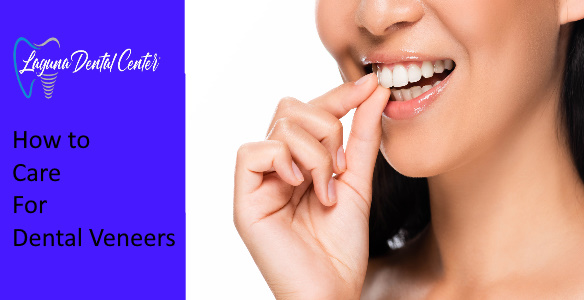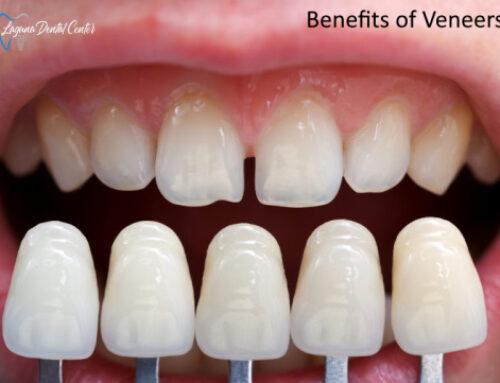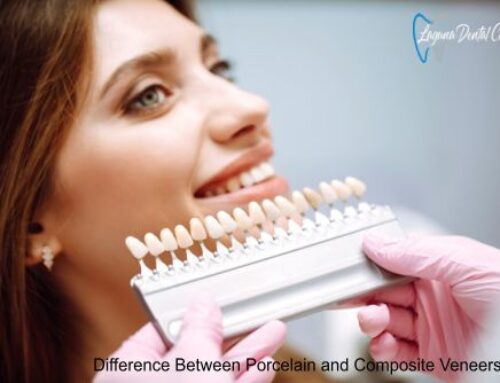Table of Contents
Maintaining your veneers will ensure their life and the health of your natural teeth. Dental veneers are little, individualized covers for the front of your teeth manufactured of tooth-colored materials. The dentist will remove enamel from your teeth to make room for the veneers to hide any chips, stains, or faults and improve the appearance of your teeth. Your teeth will be captured in an imprint so personalized veneers may be made for you. The dentist will use a bonding agent to secure the veneers after customizing them to match your teeth. According to the American Dental Association, dental veneers can endure up to ten years.
How to take care of dental veneers?
You must maintain good oral hygiene to care for your dental veneers properly. Use fluoride toothpaste, floss, and mouthwash to brush your teeth twice daily. Avoid consuming too many sweets, and keep from biting on anything hard. Avoid meals and beverages that can stain, such as red wine and dark coffee. Your veneers will also be damaged if you smoke or use tobacco.
Maintain good oral hygiene habits
Following the placement of veneers, it’s crucial to maintain good dental hygiene. If your dental health is not adequately maintained, your natural teeth will continue to be vulnerable to deterioration, cavities, and erosion. Even after getting veneers, you are still prone to gum disease. The best toothpaste for porcelain veneers is gel fluoride toothpaste. Smoking and excessive brushing can contribute to gum recession. To avoid gum disease, brush your teeth twice daily with fluoride toothpaste, floss your teeth, and use mouthwash.
Protect teeth if playing sports
Maintaining the safety of your veneers while you play sports is crucial. Wear a mouthguard to protect your teeth if you participate in any contact sport. If you play a contact sport, wear a helmet to protect your veneers. Use toothpaste with enamel strengthening if you swim competitively. Low-PH swimming pools can be acidic, destroying your teeth’s enamel.
See your dentist regularly
Once you’ve had veneers, keep going to your dentist frequently. Poor dental and treatment practices have the potential to harm veneers. To keep your teeth healthy, make sure to visit the dentist often.
Don’t chew hard materials or food
Don’t chew on anything hard or chewy after getting veneers. The surface of veneers might fracture while chewing on anything hard. Avoid eating fresh vegetables, chewing ice, and biting into pencils. Your veneers will suffer damage and last less time if you chew on something with a lot of pressure.
Don’t consume foods and drinks that cause staining
Avoid foods and beverages that will stain your veneers. Steer clear of dark beverages like coffee, dark wines, and berry juices. Your veneers will also become stained by tomato-based sauces, balsamic vinegar, soy sauce, and sticky candy.
Don’t grind and clench your teeth
After getting veneers, be mindful not to clench or grind your teeth. Avoid bruxism, which is the habit of clenching, grinding, or forward-jawing your jaw. Your veneers may fracture, chip, or become loose under the constant pressure of teeth grinding.
Don’t smoke
After getting veneers, refrain from smoking. Smoking eventually turns the bonding substance used to install the porcelain veneer brown or yellow. Smoking will damage the health of your natural teeth and create discoloration.
What to expect after getting dental veneers?
After getting veneers, you can have some tooth sensitivity and pain around the gums. The bonding chemicals used to put the veneers may cause soreness in your mouth. After getting veneers, you may experience a change in how you regularly chew, eat, or speak. Within a few weeks, you should become accustomed to how veneers feel.
What is the dental veneer recovery process?
Following the application of veneers, tooth sensitivity and gum discomfort are frequent problems. After the anesthetic has completely worn off, you may consume soft foods for one to one and a half hours following your session. It could take a few weeks for you to become used to your dental veneers and for any minor sensitivity to go completely. The health of your veneers and underlying natural teeth depends on how well you brush, floss, and manage your oral hygiene.
Do you still need to go to the dentist with dental veneers?
Even after having veneers, you still need to go to the dentist. After having veneers, it’s crucial to have regular dental exams to maintain the health of your oral hygiene. To keep your teeth healthy, make sure to visit the dentist frequently.
What foods can you eat with dental veneers?
After a few weeks, you may eat most meals you want with your veneers, although it is advised to stick to soft foods that won’t discolor or harm your teeth. After getting veneers, you should only consume soft foods for the first two weeks. After having veneers, it’s a good idea to consume chicken, pasta, mashed potatoes, bananas, and soft bread.




